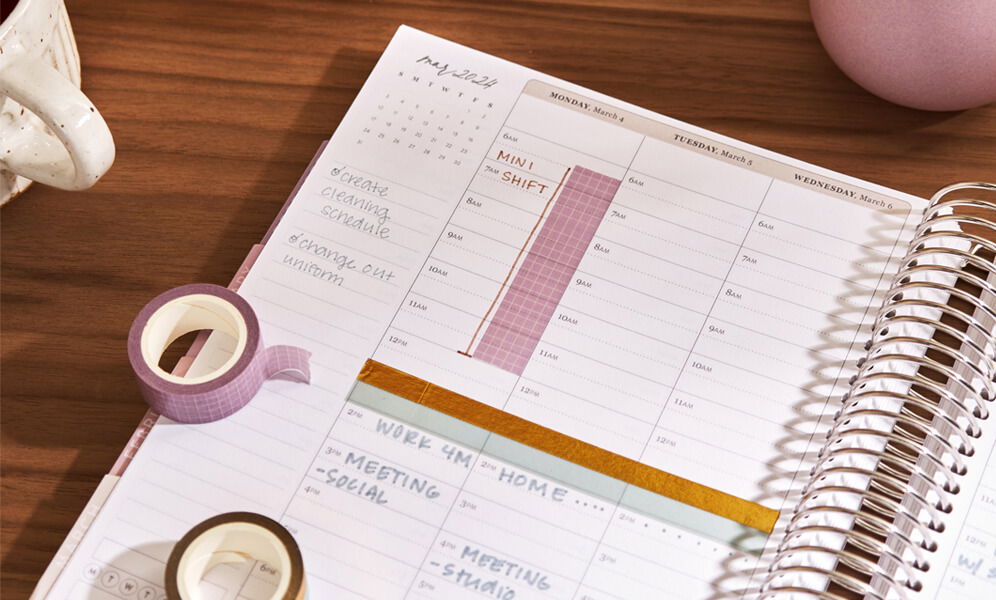How to Use a Calendar for Time Management + Why You Should

Time. It is a valuable resource that often feels like it's slipping through our fingers. The key to managing our time effectively lies in using a calendar for time management. A calendar can be a powerful tool to help you stay organized, prioritize your tasks, and achieve a better work-life balance. Let’s explore the benefits of using a calendar for time management and provide practical tips on how to make the most of it.
Why Is Time Management Important?
Good time management is crucial for several reasons. First, it helps you save time. By planning and allocating time for specific tasks, you can avoid wasting precious hours on unproductive activities or getting caught up in distractions. Second, effective time management reduces stress. When you have a clear plan and know what needs to be done, you can approach your day with confidence and peace of mind. Third, it prevents the feeling of being overwhelmed by too many tasks and deadlines.
You may also like 10 Time Management Tips to Increase Productivity.
The Benefits of Using a Calendar for Time Management
Using a calendar for time management – especially organizing your calendar for ultimate efficiency – offers numerous benefits that can significantly boost your productivity (and overall well-being!). Time management calendar benefits include:
Prioritization
A calendar allows you to prioritize your tasks effectively. By assigning specific time slots to different activities, you ensure that the most important tasks get the attention they deserve. This way, you can focus on what truly matters and avoid getting caught up in less important or urgent but not essential tasks. Prioritizing your tasks helps you make progress on your most significant goals and ensures that you allocate your time and energy accordingly.
Organization
With a time management calendar, you can bring order to your daily life. By having a visual representation of your schedule, you can see how your time is allocated and plan accordingly. This organization helps you optimize your productivity and prevents tasks from falling through the cracks. When everything is laid out in front of you, you can easily identify potential conflicts, overlapping commitments, and areas where adjustments are needed.
Avoiding Over-Commitment
It's easy to over-commit and take on more tasks than you can handle. A calendar allows you to realistically assess your availability and avoid overloading yourself. By considering your existing commitments and allocating time accordingly, you can strike a balance and ensure you don't spread yourself too thin. This way, you can maintain a healthy level of productivity without sacrificing your well-being or quality of work.
Future Planning
A calendar helps you plan ahead and stay proactive. You can add upcoming events, deadlines, and meetings to your calendar in advance, ensuring that you're well-prepared and have enough time to complete necessary preparations. This proactive approach enables you to avoid last-minute rushes and reduces stress. By having a clear view of your future commitments, you can allocate time and resources accordingly, which helps you manage your workload effectively.
How to Use a Calendar for Time Management
Now that we understand the importance and benefits of using a calendar for time management, let's delve into practical steps on how to make the most of it:
Step 1: Choosing a Calendar
Start by choosing the best calendar tool that suits your needs. Whether it's a digital calendar on your phone or computer, a wall calendar, or a paper planner, find a format that you feel comfortable with and that aligns with your lifestyle. Consider features such as reminders, syncing capabilities, and ease of use.
To maximize the benefits of analog and digital calendar planners How to Use Digital and Paper Planners.
Step 2: Setting Up a Daily, Weekly, Monthly Routine

Establish a routine for using your calendar. Set aside time at the beginning or end of each day, week, or month to review and plan your schedule. Consistency is key in developing a habit of effective time management. During this dedicated time, reflect on your goals, assess your priorities, and determine the tasks and activities that need to be included in your schedule.
For more scheduling and planning hacks, check out Daily, Weekly, and Monthly Planning Tips.
Step 3: Adding Important Events and Deadlines
Input all your important events, deadlines, and meetings into your calendar. Make sure to include both work-related and personal commitments to have a holistic view of your time. Color-coding can help differentiate between different types of activities and provide a quick visual reference.
Step 4: Blocking Out Time for Important Tasks
Allocate specific time blocks for important tasks. Identify the high-priority activities and designate dedicated time blocks for them. This way, you create a structured plan for your day, ensuring that essential tasks are not neglected. Consider your energy levels and work preferences when scheduling tasks. If you're more productive in the mornings, allocate your most challenging or important tasks during that time. Setting up strategic time blocks is a simple way to set your days and weeks up for success.
Step 5: Reviewing and Adjusting Your Calendar Regularly
Regularly review your calendar and make adjustments as needed. Things change, unexpected tasks and project arise, and priorities may shift. By regularly revisiting your calendar, you can adapt to new circumstances and maintain a flexible yet organized approach to your time management. Take note of any completed tasks, reevaluate your priorities, and make any necessary changes to your schedule moving forward.
Time Management Calendar Tips for Success
To make the most of your time management calendar, consider these additional tips:
Prioritize Important Tasks
Focus on completing your most important tasks during your peak hours of productivity. By tackling high-priority tasks when you have the most energy and focus, you can maximize your efficiency and achieve better results. This way, you ensure that the crucial to-dos are not pushed aside or left incomplete.Schedule Breaks and Personal Time
Remember to schedule breaks and personal time within your calendar. Taking regular breaks enhances your productivity and prevents burnout. Additionally, allocating time for hobbies, relaxation, and spending time with loved ones ensures a healthy work-life balance. Treat personal time as sacred and non-negotiable to maintain your overall well-being.

Avoid Overbooking
Be mindful of not overbooking yourself. Leave some buffer time between tasks, meetings, and working on projects to account for unexpected delays or additional work that may arise. This way, you can handle unforeseen circumstances without feeling overwhelmed. Be realistic about what you can accomplish within a given timeframe, and avoid the temptation to cram too many tasks on your daily to-do list.
Make Adjustments as You Discover What Works for You
Experiment with different approaches to time management and adjust your calendar as you discover what works best for you. Everyone has different preferences and productivity patterns, so don't be afraid to tweak your schedule to optimize your efficiency. Pay attention to the times when you're most productive, the types of projects that require more focus, and any patterns or habits that help you stay on track. Continuously refine your time management system to suit your unique needs and goals.
Common Mistakes to Avoid
While using a calendar for time management can greatly benefit you, there are a few common mistakes you should avoid:
Procrastination
Don't fall into the trap of constantly rescheduling tasks and pushing them to later dates. Procrastination only adds stress and hampers your productivity (which not only affects you but also team members, too). Stick to your planned schedule and strive to complete tasks on your to-do list as scheduled. If you find yourself consistently procrastinating, analyze the underlying reasons and explore strategies to overcome this habit.
Micromanaging Every Minute
While structure is important, avoid micromanaging every minute of your day. Allow for some flexibility and leave room for unexpected events or spontaneous ideas. Strive for balance rather than rigid control. Remember, a calendar is a tool to help you manage your time effectively, but it shouldn't become a source of anxiety or restriction.
Neglecting Self-Care
Remember that time management is not just about work-related tasks. Make sure to allocate time for self-care activities, exercise, and relaxation. Neglecting your well-being can lead to burnout and decreased productivity – for you and your team members – in the long run. Taking care of yourself is essential to maintain your physical and mental health, which in turn positively impacts your overall productivity and success.
Using a calendar for time management is a powerful strategy that can transform how you approach your day. It helps you prioritize tasks, stay organized, and maintain a healthy work-life balance. By following the steps outlined in this article and incorporating effective calendar management tips, you can unlock your productivity potential and make the most of your time. Embrace the power of time management, and you'll find yourself achieving more while enjoying a greater sense of control and fulfillment in your daily life. Remember, it's not just about managing time; it's about managing your life.
Explore best-selling calendars and planners to find the best time management tool for you.